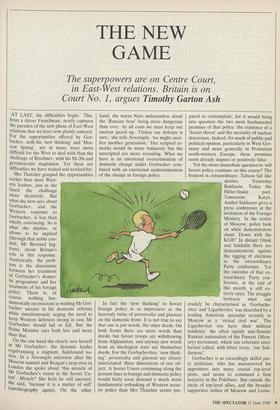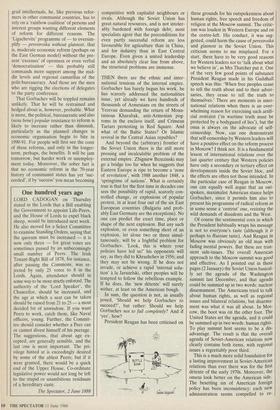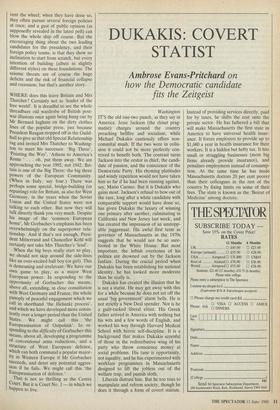THE NEW GAME
The superpowers are on Centre Court, in East-West relations. Britain is on
'AT LAST, the difficulties begin.' This, from a clever Frenchman, neatly captures the paradox of the new phase of East-West relations that we have now plainly entered. For the opportunities offered by Gor- bachev, with his 'new thinking' and 'Mos- cow Spring', are in many ways more difficult for the West to deal with than the challenge of Brezhnev, with his SS-20s and gerontocratic stagnation. Yet these are difficulties we have waited and worked for.
On the one hand she clearly sees herself in Mr Gorbachev: the dynamic leader regalvanising a stagnant, hidebound na- tion. In a Newsnight interview after the Moscow summit and Reagan's stop-over in London she spoke about 'this miracle of Mr Gorbachev's vision in the Soviet Un- ion'. Miracle? She feels he will succeed, she said, 'because it is a matter of will' (autobiography again). On the other hand, she warns Nato ambassadors about the 'Russian bear' being more dangerous than ever. At all costs we must keep our nuclear guard up. 'Unless our defence is sure,' she tells Newsnight, 'we might sacri- fice another generation.' Her scripted re- marks would be more balanced, but the unscripted are more revealing. What we have is an emotional overestimation of domestic change under Gorbachev com- bined with an emotional underestimation of the change in foreign policy.
In fact the 'new thinking' in Soviet foreign policy is as impressive as the heavenly twins of perestroika and glasnost on the domestic front. It is not true to say that one is just words, the other deeds. On both fronts there are more words than deeds: but Soviet troops are withdrawing from Afghanistan, and anyway new words from an ideological state are themselves deeds. For the Gorbachevites, 'new think- ing', perestroika and glasnost are closely interrelated: three dimensions of one ob- ject. A Soviet Union continuing along the present lines in foreign and domestic policy would fairly soon demand a much more fundamental rethinking of Western secur- ity policy than Mrs Thatcher seems pre- pared to contemplate, for it would bring into question the two most fundamental premises of that policy: the existence of a 'Soviet threat' and the necessity of nuclear deterrence. Indeed, for much of public and political opinion, particularly in West Ger- many and more generally in Protestant north-western Europe, these premises seem already suspect or positively false.
Yet the more immediate question is: will Soviet policy continue on this course? The ferment is extraordinary. Taboos fall like skittles. Yesterday Bukharin. Today the Hitler-Stalin pact.
Tomorrow: Katyn.
Gorbachev is an exceedingly skilful par- ty politician, who has manoeuvred his appointees into many crucial top-level posts, and seems to command a firm majority in the Politburo. But outside the circle of top-level allies, and the broader supportive milieu of Moscow and Lenin- grad intellectuals, he, like previous refor- mers in other communist countries, has to rely on a 'rainbow coalition' of persons and interest groups wanting different elements of reform for different reasons. The `Ligachevite' programme of — to oversim- plify — perestroika without glasnost, that is, moderate economic reform (perhaps on the East German model) without the pre- sent 'excesses' of openness or even verbal 'democratisation' — this probably still commands more support among the mid- dle levels and regional camarillas of the polit-bureaucracy. And those are the men who are rigging the elections of delegates to the party conference.
That Gorbachev will be toppled remains unlikely. That he will be restrained and hedged about is, however, probable. What is more, the political, bureaucratic and also (nota bene) popular resistance to reform is likely to increase rather than diminish, particularly as the planned changes in economic organisation begin to bite in 1990-91. For people will first see the costs of these reforms, and only in the longer- term, perhaps, the benefits. It will be jam tomorrow, but harder work or unemploy- ment today. Moreover, the sober fact is that no economic reform in the 70-year history of communist states has yet 'suc- ceeded', if by 'success' you mean becoming competitive with capitalist neighbours or rivals. Although the Soviet Union has great natural resources, and is not intoler- ably burdened with foreign debt, most specialists agree that the preconditions for even partly successful reform are less favourable for agriculture than in China, and for industry than in East Central Europe. Even given a united leadership and an absolutely clear line from above, the structural problems are immense.
THEN there are the ethnic and inter- national tensions of the internal empire. Gorbachev has barely begun his work, he has scarcely addressed the nationalities issue, yet already we have hundreds of thousands of Armenians on the streets of Yerevan demanding the return of Moun- tainous Kharabak, anti-Armenian pog- roms in the enclave itself, and Crimean Tartars protesting in Red Square. And what of the Baltic States? Or Islamic revival in the Central Asian republics?
And beyond the (arbitrary) frontier of the Soviet Union there is the still more pressing and incalculable problem of the external empire. Zbigniew Brzezinski may go a bridge too far when he suggests that Eastern Europe is ripe to become a 'zone of revolution', with 1988 another 1848, a 'springtime of nations'. What is certainly true is that for the first time in decades one sees the possibility of rapid, scarcely con- trolled change, or explosions of popular protest, in at least four out of the six East European countries (Bulgaria and prob- ably East Germany are the exceptions). No one can predict the exact time, place or shape of the next explosion. But any such explosion, or even something short of an explosion, let alone two or three simul- taneously, will be a frightful problem for Gorbachev. 'Look, this is where your policies have led us!' his opponents will say, as they did to Khrushchev in 1956; and they may not be wrong. If he does not invade, or achieve a rapid 'internal solu- tion' a la Jaruzelski, other peoples will be tempted to follow the rebellious example. If he does, the 'new détente' will surely wither, at least on the American bough.
In sum, the question is not, as usually posed, 'Should we help Gorbachev to succeed?', but rather: Should we help Gorbachev not to fail completely? And if 'yes', how?
President Reagan has been criticised on these grounds for his outspokenness about human rights, free speech and freedom of religion at the Moscow summit. The critic- ism was loudest in Western Europe and on the centre-left. His conduct, it was sug- gested, could harm the cause of perestroika and glasnost in the Soviet Union. This criticism seems to me misplaced. For a start, there have to be very good reasons for Western leaders not to 'talk about what we believe in', as Mrs Thatcher put it. One of the very few good points of substance President Reagan made in his Guildhall speech was this: 'When free peoples cease to tell the truth about and to their adver- saries, they cease to tell the truth to themselves.' There are moments in inter- national relations when there is an over- whelming reason for exercising such artifi- cial restraint (in wartime truth must be protected by a bodyguard of lies'), but the onus is always on the advocate of self- censorship. Now, can one demonstrate that self-censorship by Western leaders will have a positive effect on the reform process in Moscow? I think not. It is a fundamental lesson of international relations over the last quarter century that Western policies have only a secondary or tertiary effect on developments inside the Soviet bloc, and the effects are often not those intended. In the particular case of Reagan in Moscow, one can equally well argue that an out- spoken, maximalist American stance helps Gorbachev, since it permits him also to present his programme of radical reform as in some sense a 'centrist' one, resisting the wild demands of dissidents and the West.
Of course the sentimental corn in which the President habitually wraps his message is not to everyone's taste (although it is perhaps to Russian taste). And Reagan in Moscow was obviously an old man with fading mental powers. But these are tran- sient side-issues. The overall American approach to the Moscow summit was good and effective. As I pointed out in these pages (2 January) the Soviet Union basical- ly set the agenda of the Washington summit last December, and that agenda could be summed up in two words: nuclear disarmament. The Americans tried to talk about human rights, as well as regional issues and bilateral relations, but disarma- ment was what it was all about. In Mos- cow, the boot was on the other foot. The United States set the agenda, and it could be summed up in two words: human rights. To play summit host seems to be a dis- advantage. The result is triat the overall agenda of Soviet-American relations now clearly contains both items, with regional issues a regrettably poor third.
This is a much more solid foundation for a lasting improvement in Soviet-American relations than ever there was for the first détente of the early 1970s. Moreover, the omens look better on the American side. The besetting sin of American foreign policy has been inconsistency: each new administration seems compelled to re- vent the wheel; when they have done so, they often pursue several foreign policies at once; and a gust of public opinion (as supposedly revealed in the latest poll) can blow the whole ship off course. But the encouraging thing about the two leading candidates for the presidency, and their foreign policy teams, is that they show no inclination to start from scratch, but every intention of building (albeit in slightly different styles) on these foundations. The seismic threats are of course the huge deficits and the risk of financial collapse and recession; but that's another story.
WHERE does this leave Britain and Mrs Thatcher? Certainly not as 'leader of the free world'. It is dreadful to see the whole threadbare old wardrobe of British post- war illusions once again being hung out by Mr Bernard Ingham on the dirty clothes lines of the popular press, just because President Reagan stopped off in the Guild- hall to give us that old Special Relationship rag and invited Mrs Thatcher to Washing- ton to meet his successor. 'Big Three', 'Pointing the Way', 'Athens to America's Rome ' . • . oh, put them away. We are approaching the year 1992, not 1942. Bri- tain is one of the Big Three: the big three powers of the European Community. (When in Italy, say four.) There was Perhaps some special, bridge-building (or repairing) role for Britain, as also for West Germany, in the years when the Soviet Union and the United States were not talking to each other. But now they will talk directly thank you very much. Despite his image of the 'common European home', Mr Gorbachev's emphasis has been overwhelmingly on the superpower rela- tionship. And if that's not enough, Presi- dent Mitterrand and Chancellor Kohl will certainly not take Mrs Thatcher's 'lead'.
When the big boys really start to play, we should not skip around the side-lines like an over-excited ball boy (or girl). This is demeaning and irrelevant. We have our own game to play, as a major West European power. In responding to the opportunity of Gorbachev this means, above all, extending, in close consultation With West Germany and France, the whole Panoply of peaceful engagement which we call in shorthand 'the Helsinki process', and which we have developed more consis- tently over a longer period than the United States. We might call this 'the Europeanisation of Ostpolitik'. In re- sponding to the difficulty of Gorbachev this means, above all, developing a programme of conventional arms reductions, and a structure of West European defence, Which can both command a popular major- ity in Western Europe if Mr Gorbachev succeeds, and deter any potential aggres- sion if he fails. We might call this 'the Europeanisation of defence.'
That is not so thrilling as the Centre Court. But it is Court No. 1— in which we happen to live.




































































 Previous page
Previous page